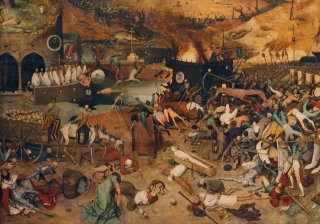How Pandemics Past and Present Fuel the Rise of Mega-Corporations
Some organizations find opportunity amid crisis.
By the 1960s, the idea that there was some fundamental difference between small and large forms of business added environmentalism to these longstanding arguments. “The man” in his skyscraper was opposed to the more authentic artisan.
This faith in local business combined with a suspicion of corporations and the state have flowed into the green, Occupy and Extinction Rebellion movements. Eating local food, using local money, and trying to tilt the purchasing power of “anchor institutions” like hospitals and universities towards small social enterprises has become the common sense of many contemporary economic activists.
But the COVID-19 crisis questions this small is good, big is bad dichotomy in some very fundamental ways. Large scale organising has appeared to be necessary to deal with the huge range of issues that the virus has thrown up, and the states that appear to have been most successful are those which have adopted the most interventionist forms of surveillance and control. Even the most ardent post-capitalist would have to admit that small social enterprises could not fit out a gigantic hospital in a few weeks.
And though there are plenty of examples of local businesses engaging in food delivery, and a commendable amount of mutual aid taking place, the population of the global north is largely being fed by large supermarket chains with complex logistics operations.
After coronavirus
The long-term result of the Black Death was the strengthening of the power of big business and the state. The same processes are happening much more rapidly during the coronavirus lockdown.
But we should be cautious of easy historical lessons. History never really repeats itself. The circumstances of each time are unique, and it simply isn’t wise to treat the “lesson” of history as if it were a series of experiments that prove certain general laws. And COVID-19 will not kill a third of any population, so though its effects are profound, they will not result in the same shortage of working people. If anything, it has actually strengthened the power of employers.
The most profound difference is that the virus comes in the middle of another crisis, that of climate change. There is a real danger that the policy of bouncing back to a growth economy will simply overwhelm the necessity of reducing carbon emissions. This is the nightmare scenario, one in which COVID-19 is just a prequel to something much worse.
But the huge mobilisations of people and money which governments and corporations have deployed also shows that big organisations can reshape themselves and the world extraordinarily rapidly if they wish. This gives real grounds for optimism concerning our collective capacity to re-engineer energy production, transport, food systems and much else – the green new deal which many policy makers have been sponsoring.
The Black Death and COVID-19 seem to have both caused concentration and centralisation of business and state power. That is interesting to note. But the biggest question is whether these potent forces can be aimed at the crisis to come.
To hear about new Insights articles, join the hundreds of thousands of people who value The Conversation’s evidence-based news. Subscribe to our newsletter.
![]()
Eleanor Russell, PhD Candidate in History, University of Cambridge and Martin Parker, Professor of Organisation Studies, University of Bristol
This article is republished from The Conversation under a Creative Commons license. Read the original article.
Image: Wikimedia Commons

